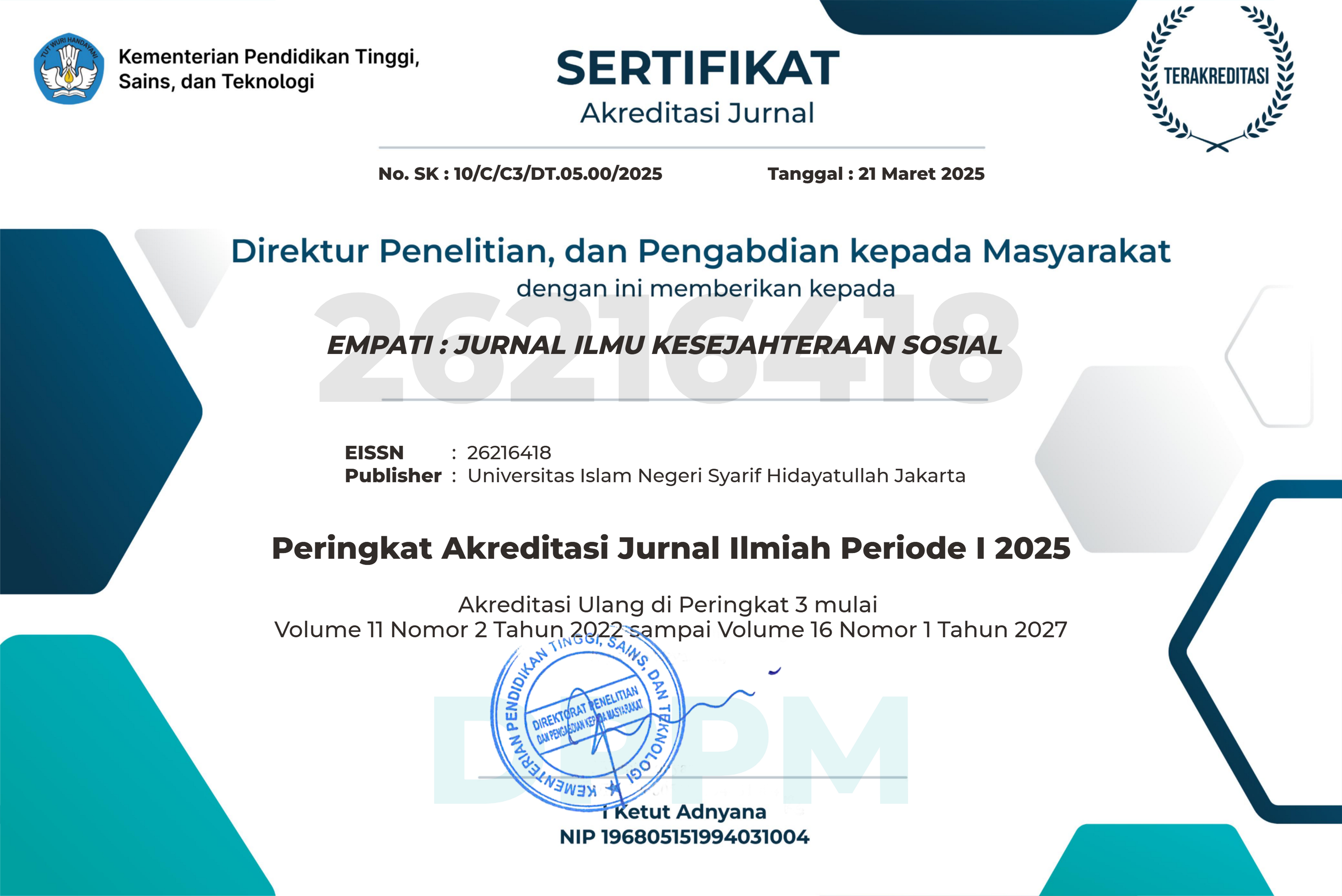Author Guidelines
Empati: Jurnal Ilmu Kesejahteraan Sosial – Author Guidelines
Empati: Jurnal Ilmu Kesejahteraan Sosial, published twice a year since 2013, is a forum for original research articles and review papers by individual authors or research groups in social welfare and social work. The journal aims to advance knowledge and practice in social welfare and social work and to provide an academic reference for social issues in society.
We welcome research related to development issues, community development, social work practice, and human service organizations. The journal accepts research articles, original research reports, reviews, short communications, and scholarly commentaries in social welfare, social work, development studies, and human services.
Manuscripts may be written in Indonesian or English. Authors whose first language is not English are encouraged to have their manuscript checked for grammar and clarity before submission. Submitted work must be original and not published or under consideration elsewhere.
- General Author Guidelines
All manuscripts must be submitted through the online system at: http://journal.uinjkt.ac.id/index.php/empati/user/register. Register as an Author (and optionally as a Reviewer). If you experience difficulties, contact the Editorial Office at jurnal.empati@uinjkt.ac.id.
Accepted manuscript types: Original Research Article, Review Article, and Short Communication.
- Manuscript Template
Please prepare your manuscript using the journal template. Download: DOC | PDF.
- Peer Review
Each submission is independently reviewed by at least one peer reviewer. The decision to accept, revise, or reject is based on the reviewers’ recommendations. If a manuscript is deemed unsuitable, a statement of reasons will be sent to the authors, typically within three months of submission.
- Revision
Revised manuscripts should be returned without delay via the Online Submission interface (journal link). Revisions submitted after three months may be treated as new submissions.
- Editorial Office
Siti Napsiyah (Editor in Chief)
Program Studi Kesejahteraan Sosial, Fakultas Ilmu Dakwah dan Ilmu Komunikasi, UIN Syarif Hidayatullah Jakarta
Jl. Ir. H. Juanda No. 95, Ciputat, Tangerang Selatan, Banten 15412, Indonesia
Phone: (+62-21) 7432728 / 74703580
Email: jurnal.empati@uinjkt.ac.id - Online Submission Guide
Register at this page, complete all required fields, then follow the five-step submission process:
- Start: Choose the appropriate section (Original Research Article, Review Article, or Short Communication) and complete the submission checklist.
- Upload Submission: Upload the manuscript file.
- Enter Metadata: Provide detailed author information (mark the corresponding author), then enter the title, abstract, and keywords.
- Upload Supplementary Files: If applicable, upload any additional files.
- Confirmation: Review all files and information, then click Finish Submission. A confirmation email will be sent to the corresponding author, who can track progress by logging in.
- Author Fees (Page Charge)
Empati is an open access journal. There is no submission fee. A publication fee may apply upon acceptance to cover publication costs. All readers can access and download full-text articles free of charge.
- User Rights
All articles are published Open Access and are free to read and download. The journal currently applies the following license:
- Creative Commons Attribution-ShareAlike (CC BY-SA)
- Manuscript Preparation
- Scope: Manuscripts should address social welfare, social work, development studies, or human service organizations.
- Originality: Upon acceptance, authors must confirm that the work has not been published or is under review elsewhere.
- Structure:
- Title: Brief, clear, informative, max 12 words. Capitalize the first letter of major words.
- Authors and Affiliations: Provide author names (without academic or job titles), affiliations, and email addresses. Identify the corresponding author.
- Abstract & Keywords: Abstract under 150 words covering background, objective, method, results, and implication; 2–5 keywords.
- Introduction: Background, aims, novelty/contribution.
- Literature Review & Methods: Analytical tools, data, and sources.
- Discussion: Present and interpret results clearly; avoid duplicating the same data in both tables and figures; relate findings to the literature.
- Conclusions: Main conclusions and, where relevant, policy implications.
- References: Prioritize recent sources (last 10 years), with at least 80% journal articles when possible. Use consistent APA style.
- In-text Citations: Provide citations for direct quotations and when paraphrasing or summarizing. Include author surname(s), year, and page number(s) for direct quotes.
- Reference Style: Empati uses APA style based on:
American Psychological Association. (2010). Publication manual of the American Psychological Association (6th ed.). Washington, DC: Author.
More info: apastyle.org/apa-style-help.aspx - Formatting:
- Paper size A4, single-sided, 1.5 line spacing.
- Font Times New Roman, size 12. First line indent 0.5 cm.
- Maximum length 25 pages.
- Margins: Top/Bottom 3 cm; Left/Right 2.5 cm.
- Title: 14 pt, centered; Subtitles: capitalize major words, left aligned.
- Tables and figures: use Arabic numbering; table titles above tables, figure titles below figures; include sources where relevant.
- Good Practice: Use a reference manager (e.g., EndNote, Mendeley, Zotero). Avoid pasting raw software outputs; present results as equations/tables with appropriate statistics.
- Acknowledgments: If any, place as a footnote to the title page.
- Author Index & Subject Index: Where applicable, include a subject index (key terms) and an author index (family name followed by given name).
- Brief Author Bio: Provide a short CV including full name, academic title, institution, and contact details.
Examples (APA style):
- Book (one author): Cochrane, A. (2002). Pemikiran-pemikiran dalam pembangunan kesejahteraan sosial. Jakarta: LPEM UI.
- Book (two authors): Ife, J., & Tesoriero, F. (2005). Community development (3rd ed.). Frenchs Forest: Pearson.
- Chapter in edited book: Richards, K. C. (1997). Views on globalization. In H. L. Vivaldi (Ed.), Australia in a global world. North Ryde: Century.
- Corporate author: Australian Institute of Health and Welfare. (2009). Indigenous housing needs 2009 (AIHW cat. no. HOU 214). Canberra: Author.
- Journal article (with DOI): Sen, A. (2001). Ten theses on globalization. New Perspectives Quarterly, 18(4), 9–15. https://doi.org/10.1111/0893-7850.00430
- Online image: Monet, C. (1890). Haystacks, midday [Painting]. National Gallery of Australia. URL
If a source is cited within another source, use: “Lilly (as cited in Maxwell, 1999, p. 25) stated that …”. For sources without page numbers, use paragraph numbers or section headings (e.g., para. 2).
















